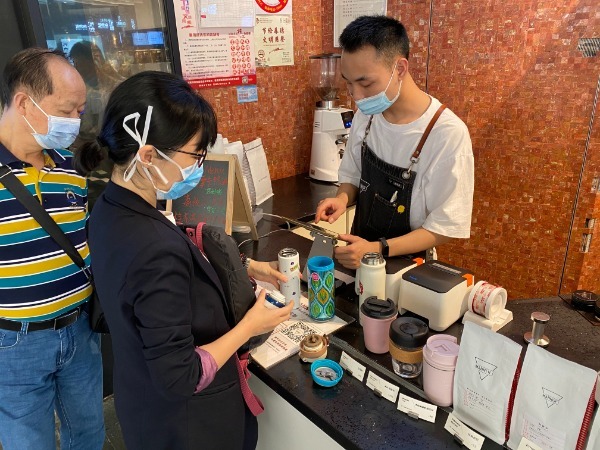 |
|
A consumer holding her own cup buys coffee at Manner Coffee in Shanghai.[Photo by He Qi/China Daily] |
Fan Lihong, her parents and her daughter are standing along Madang Road in Shanghai, cups in hand. Many others in the line are doing the same.
From afar, such a scene might seem reminiscent of water rationing. But these individuals are simply after a caffeine fix, with sustainability in mind.
"I have been using my own cups to buy coffee this year. Using my own cup is not only convenient and cost effective-it also helps with environmental protection," says Fan.
Another customer who was waiting in a line outside Manner Coffee, Liu Shiyun, echoes the same sentiment.
"A latte at Manner Coffee costs 15 yuan ($2.24). If I use my own cup to buy the coffee, I get 5 yuan discount and will save at least 100 yuan per month," Liu says.
"I hope more coffee shops can promote this concept as it is environmentally friendly and cost-effective."
Manner Coffee, which operates over 100 stores across China, sells nearly 100,000 cups of coffee per day. A quarter to a third of their customers bring their own cups, according to Ning Yihan, marketing representative of Manner.
"We started to encourage consumers to bring their own non-disposable cups to Manner stores since the day we were established. We hope to contribute to environmental protection with our customers," Ning says.
"It is very interesting and meaningful while you see all kinds of people bringing their own cups. There are Japanese-style izakaya store owners bringing beer mugs and security or sanitation workers with their thermoses," she adds.
For others like Ping Jing, a 26-year-old nurse who usually buys her coffee from Writer Coffee on Weihai Road, using her own mug is not just about cutting down on costs, but taste as well.
"A glass cup or mug will give you a different taste and an exclusive feel compared with using the disposable paper cup," she says.
"More people are drinking coffee today. We don't just wish to drink coffee-we also hope this habit can be environmentally friendly."
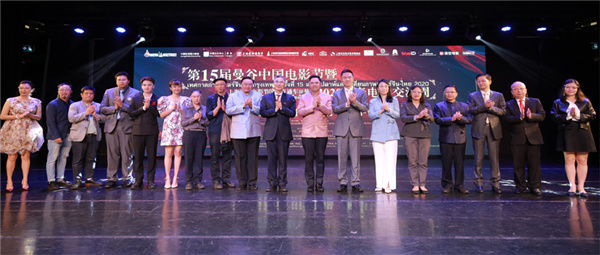 |
The 15th Chinese Film Festival in Bangkok and the 2020 China-Thailand Film Exchange Week opens at the China Cultural Center in Bangkok on Oct 25, 2020. [Photo provided to Chinaculture.org] |
On Oct 25, the opening ceremony of the 15th Chinese Film Festival in Bangkok and the 2020 China-Thailand Film Exchange Week was held at the China Cultural Center in Bangkok. The event was hosted by the China Cultural Center in Bangkok and received strong support from the Chinese Embassy in Thailand and the Thai Ministry of Culture.
The COVID-19 pandemic doesn't impede the enthusiasm for cultural exchange between China and Thailand. This film festival uses live broadcast to present the opening ceremony and host the "China-Thailand Film Exchange and Cooperation Online Seminar". During the film festival, audiences can use the online platform of the China Cultural Center in Bangkok to watch films online, which greatly increases the global reach of the festival.
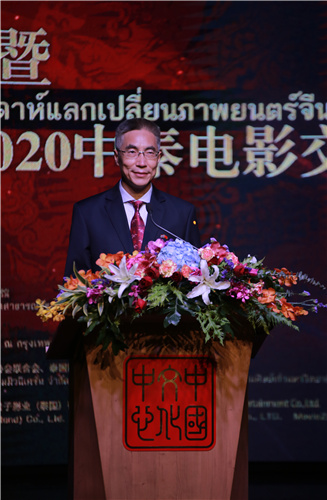 |
Gu Hongxing, director of the China Cultural Center in Bangkok and China Tourism Office in Bangkok, speaks at the opening ceremony. [Photo provided to Chinaculture.org] |
Gu Hongxing, director of Bangkok's China Cultural Center and China Tourism Office, said film can not only introduce one's national culture, but also reflect unique social landscapes. Film has become an important part of cultural exchange between countries and enhance mutual understanding among people around the world.
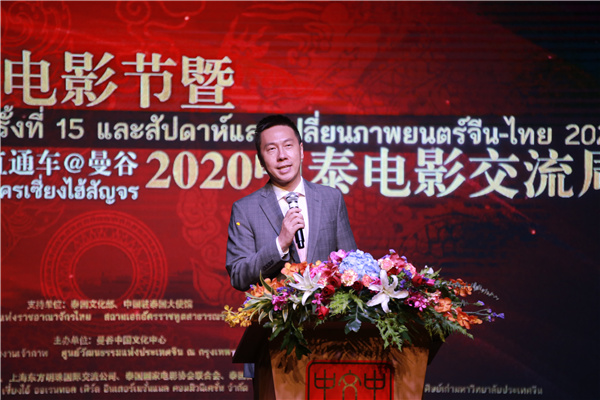 |
Yang Xin, Chargé d'affaires of the Chinese Embassy in Thailand, speaks at the opening ceremony. [Photo provided to Chinaculture.org] |
Yang Xin, Chargé d'affaires of the Chinese Embassy in Thailand, said since the establishment of diplomatic relations between China and Thailand 45 years ago, the mutual trust between the two countries has continued to deepen, economic and trade cooperation has expanded, cultural exchanges have become closer, and all-around cooperation has achieved fruitful results. Both China and Thailand have a vast film market. As a traditional project of cultural exchanges between China and Thailand, the Bangkok Chinese Film Festival has laid a solid foundation for film cooperation between the two countries for 15 years and will add new drive to the promotion of cultural exchanges and cooperation between China and Thailand.
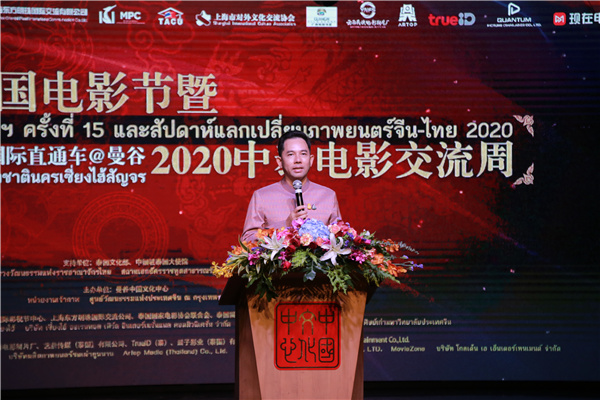 |
Itthiphol Kunplome, Thailand's minister of culture, speaks at the opening ceremony. [Photo provided to Chinaculture.org] |
Thailand's Minister of Culture Itthiphol Kunplome said in his speech the governments and people of Thailand and China have been in constant exchange. Cooperation in various fields has developed steadily, and the film festival is another important event to further promote cultural exchanges between the two countries. The people of the two countries can promote their understanding of the cultures of both sides through films, and promote friendly relations and cooperation in other perspectives.